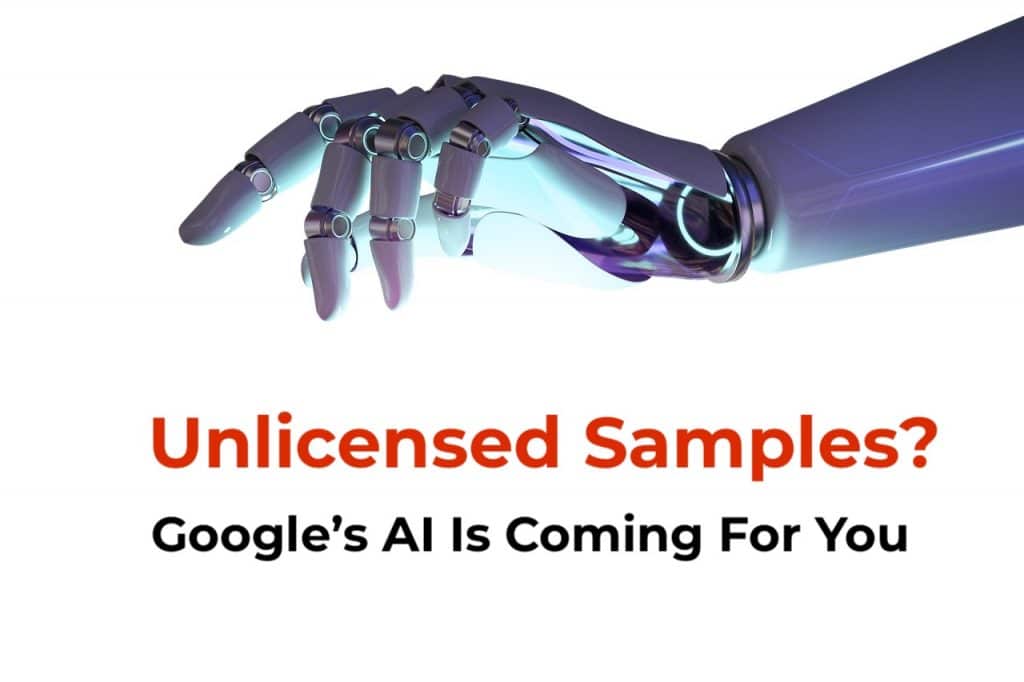Google AI can now uncover stolen music samples
Google has developed AI that can snuff out samples from copyrighted songs that may have been disguised with audio editing. How will this affect the future of digital music?
by Bobby Owsinski from Music 3.0
The sound of modern music is based on samples. Many times they’re legitimately licensed, credited or purchased, but there’s still a lot that are used without permission. This is easily accomplished by shifting the pitch or using the many modulators and saturation plugins that are available to make the sound virtually unrecognizable from its original form. Those days may be over however, as a clever use of Google’s AI Assistant is revealing many samples for the first time.
Back in the early days of sampling I was working with a famous DJ who’s secret sauce was taking tracks from artists from small foreign countries then digitally manipulating the crap out of them. It was a great strategy that kept his licensing costs down around zero, but it certainly didn’t help the artists and songwriters who could’ve used a little extra boost in the pocketbook. Even as the years went on and management teams and labels became much better at spotting unlicensed samples, I’m not sure if his ruse was ever discovered.
But that was before AI came along to lend a helping hand.

A Happy Accident
Now thanks to some clever sampling sleuths, Google’s AI can detect a sample as little as a half-second long that’s even been chopped and time stretched. That’s because even though Google Assistant uses the same fingerprinting technology as Shazam, it’s deep neural network is miles ahead when it comes to sample identification.
To be clear, sample detection was never an intended job for Google Assistant. It’s ability was found by accident. A sample hunter by the name of DJPasta figured out a way to feed audio directly into the Google AI and was surprised when it identified every song. After digging deeper he discovered that it could also uncover the samples used as well. Just like that, a new use for the technology was found.
There Are Ramifications
A few things come to mind about what might happen in the future as a result of Google sample detection. First of all, it’s going to make it way easier for labels and managers to uncover unlicensed samples. You can bet that they already have teams scouring hits of the past 25 years trying to track down some moneymakers. There’s lots of legal action coming down the pike.
Probably more ominous is the fact that YouTube’s Content ID and the similar technologies that every social and content platform uses will eventually utilize something similar to Assistant in the future. When that happens, it will be way tougher to upload unlicensed material, and probably impossible to upload cover songs as well. That will open up a whole can of worms of validating songs that have licensed content, which is a pain already.
Music AI is definitely here to stay, and just like Google AI’s ability to discover hidden samples, we’re only scratching the surface of what the technology can be used for.
Bobby Owsinski is a producer/engineer, author and coach. He has authored 24 books on recording, music, the music business and social media.
Read more: https://music3point0.com/2023/03/03/googles-ai-can-now-reveal-hidden-samples/#ixzz7uyMoyZ5h
Under Creative Commons License: Attribution Non-Commercial Share Alike
This technology will be a valuable resource for music copyright owners, as it will help them protect their intellectual property and prevent unauthorized use of their work. It could also potentially help artists in identifying and proving plagiarism in the music industry.